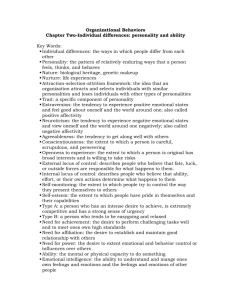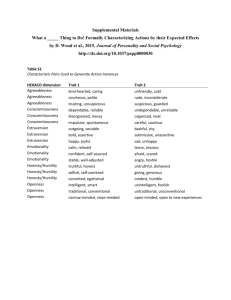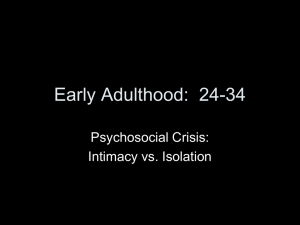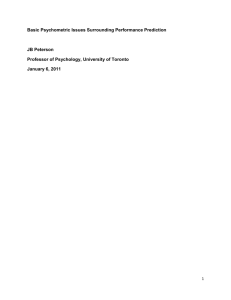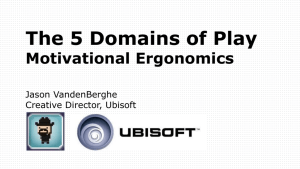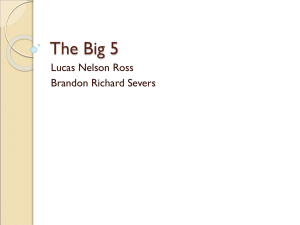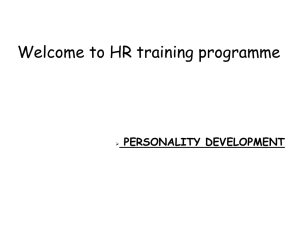Document
advertisement
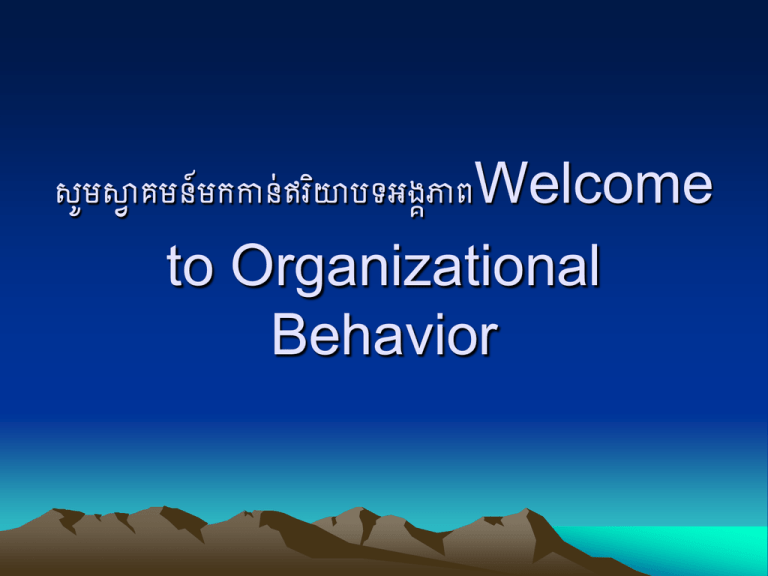
សូមស្វាគមន៍មកកាន់ឥរិយាបទអង្គភាពWelcome to Organizational Behavior លំនំដ ើម នន ឥរិយាបថរបស់អង្គភាពINTRODUCTION TO ORGANIZATIONAL BEHAVIOR អង្គភាពគឺជាអា?ី What is organization? • ការប្បមូលផ្តំននមនុសសដ លបានដ្ាើការរួមគ្នាដ ើមបីសំដរចបាននូវដគ្នលដៅជាបុគគលនងង្អង្គភាពមួ។ • A collection of people who work together to achieve individual and organizational goals. ឥរិយាបទគឺជាអា?ី What is behavior? ឥរិយាបទ Behavior អាកបបកងរយា ិ Attitude ទសសនៈ Perception តនមៃ Value ដតើអាីដៅជាមនុសសម្នាក់ដ លនំមកនូវជាមួ។គ្នត់ / នង្ដៅដពលដ លដ្ាើការជាមួ។អង្គភាពមួ។ What a person bring with him/ her, when working with an organization ឧទាហរណ៍: - ជំនញ Skills - ចំដណេះ ឹង្ Knowledge - វបប្ម៌ Culture - ទសសនៈ/ ឥរយាបថ Perception/behavior - ប្បាជាា Wisdom - បទពងដស្វ្មន៍ Experiences - ការទំនក់ទមនង្ Relationship ឬ OR - 4 hs = Head, Heart, Hand, Hope ។ល់ ឹង្អំពី UNDERSTAND THE “BIG FIVE” FIVE PERSONALITY DIMENSIONS (វិស្វលភាព) Dimension People who score “high” on this dimension tend to be more មនសងការ ការប្បង្ត ប្ប។័ត,ា ភាពអាប្ស។័ នឹង្, ម្ននវនិ ។័ ខ្ៃនួ ឯង្ conscientiousness Careful, dependable, self-disciplined សថងរភាពអារមមណ៍ Emotional stability សប្ម្នក, សុវតថងភាព, សងប់ស្វងត់ ភាពដបើកទូលា។បទពងដស្វ្ន៍ Openness to experience សរីរាង្គវិញ្ញាណ, អាចបត់ដបនបាននចាប្បឌងត, ចង្់ ឹង្ចង្់ដ ើញ ការប្ពមដប្ពៀង្ សុភាពរាបស្វរ, លអ-្មមជាតង, ការ។ល់ចងត្, ការដថ Agreeableness Courteous, good-natured, empathic, caring អត្ចរិក Extroversion Relaxed, secure, calm Sensitive, flexible, creative, curious ដចញ, ការពងភាកា, រសក់ទាក់, ដោលអេះអាង្ការោរខ្ៃួន Outgoing, talkative, sociable, assertive What is organizational Behavior • ការសងកាននកត្ត្ដ លបេះោល់ ល់រដបៀបដ លបុគគលនងង្ជាប្កតមដ្ាើសកមមភាពដៅកាតង្អង្គការនងង្អង្គការរដបៀបដ្ៃើ។តបដៅនឹង្បរិយាកាសបស់ពួកដគ The study of factors that affect how individuals and groups act in organizations and how organizations respond to their environment. • ឥរិយាបទអង្គភាពគឺជាប្ទពយសកមមពហុ-វិន័។: Organizational Behavior is a multi- disciplinary assets: - ចងត្វិទា, Psychology - ប្គប់ប្គង្ Management, - វិទាស្វប្សតសង្គម Social Science, - នរវិទា Anthropology, - ចងត្គរុដកាសលយនងង្អង្គភាព Organizational Psychology - ការប្គប់ប្គង្្នធានមនុស (HRM) Human Resource Management ំដណើរការការ។ល់ដ ញើ PERCEPTION PROCESS គំរូនន ដំ ណើរការ។ល់ដ ញើ ដនេះ Model of the perception process បរិយាកាស STIMULI ENVIRONMENTAL STIMULI អារមមណ៍ ការស្វាប់ Feeling Hearing ការដ ើញ Seeing ឃានវិញ្ញាណ Smelling ការស្វកលបង្ Testing ការ។កចងត្ទុកដាក់ដ លបានដប្ជើសដរីស Selective attention Perceptual O.R.G and interpretation Emotions and behavior The process of filtering information received by our sense. ( make sense of it ) KEY QUESTIONS • • • How OB benefits managers? What skills needed for manager? What are the key challenges for manager, When learning about OB? How OB benefits managers? • Helps managers to use the tools to understand the complexity of the behavior of an organization. • Have the capacity to manage changes when necessary What skills needed for manager? • • • Conceptual skills: Analysing and diagnose a situation: Planning and organizing need high level of conceptual skills. Human skills: Human skills: Ability to work with, lead and control the behavior and the ability to learn acquired skills Technical skills What are the key challenges for manager, after learning OB? • • • • • • • • The changing social and cultural environment: Age Fairness & justice? Gender Flexibility? Race Decision making? Ethnicity & Religion Performance? Sexual orientation, Social economic background Capacity disability • 2. The evolving of global environment • 3. Advancing information technology • 4. Shifting work and employment relationship. Understanding and Managing Organizational Behavior Requires the study of: Individual in organization Group &Team Process Organizational Process INDIVIDUAL DIFFERENCES: Personality and Ability Overview • Each member of an organization has his or her own style and ways of behaving. • Effectively working with others requires an understanding and appreciation of how people differ from one another. • Managers needs to understand individual differences because they have an impact on the feelings, thoughts, and behavior of each member of an organization. The Nature Of Personality • Personality: Is the pattern of a way in which a person feels, thinks, and behaves. • Personality has been shown to influence career choice, job satisfaction, stress, leadership, and some aspects of job performance. • People personalities can be described in variety of way. Some people seems to be perfectionist, can be critical, impatient, demanding, and intense, always smile, have fun around, shy, and quiet. Determinants Of Personality: Nature Biological heritage Personality Nurture Life experiences The Big Five Model Of Personality, • Extraversion or Positive affectivity: The tendency to experience positive emotional states and feel good about oneself and the world around one; also called positive affectivity. • Extraverts: People high on extraversion scale-tend to be sociable, affectionate, and friendly. • Introverts: People low on extraversion scale- are less likely to experience positive emotional state and have fewer social interaction with other Neuroticism: • Neuroticism or Negative affectivity: The tendency to experience negative emotional states and view oneself and the world around one negatively; also called negative affectivity. Individuals who are high on neuroticism are more likely to experience negative moods at work, feel stressed and emotion, and generally have a negative orientation toward the work situations. Agreeableness • Agreeableness: Is the trait that captures the distinction between individuals who get along well with other people and those who do not. • Likeability in general and the ability to care for other and to be affectionate characterize individuals who are high on agreeableness. • Individuals low on agreeableness are antagonistic, mistrustful, unsympathetic, uncooperative, and rude. Conscientiousness • Conscientiousness: Is the extent to which an individual is careful, scrupulous, and persevering. • Individuals high on conscientiousness are organized and have a lot of self-discipline. • Individuals low on conscientiousness may lack direction and self-discipline. Openness to Experience: • Openness to experience: Is the captures the extent to which an individual is open to a wide variety of stimuli, has broad interests, and is willing to take risks ask opposed to being narrow-mined and cautious. • For jobs that change frequently, require innovation, or involve considerable risk, individuals who are high on openness to experience may have an advantage. • Although openness to experience clearly is an advantage for entrepreneurs and performing jobs that require innovation, organizations also need people to perform jobs that do not allow much opportunity for originality, and sometime afraid to take the risk that employee high on openness to experience may thrive on. Other Organizationally Relevant Personality Traits • Organizationally Relevant Personality Traits: • • • • • • • Locus of control Self monitoring Self Esteem Type A and Type B personality Need for achievement Need for affiliation Need for power Locus of control • External locus of control: Describes people who believe that fate, luck, or outside forces are responsible for what happens to them. mnusSeCOelIe®Bgvasna ®Bhµlixit/kmµ-pl • Internal locus of control: Describes people who believe that ability, effort, or their own actions determine what happens to them. mnusSeCOelI®TwsßIxøÜn®tUvTIBwgxøÜn Self-Monitoring ®Kb;®KgxøÜnÉg • Self-monitoring is the extent to which people try to control the way they present themselves to others. • High self-monitors want their behavior to be socially acceptable and are attuned to any social cues that signal appropriate or inappropriate behavior. • Low self-monitors are not particularly sensitive to cues indicating acceptable behavior, nor are overly concerned about behaving in a situationally appropriate manner, guided by their own attitudes, beliefs, feeling and principles and are not too concerned about what other think of their behavior. Self-Esteem eGaytémøxøÜnÉg • Self-esteem is the extent to which people have pride in themselves and their capabilities. • Individuals with high self-esteem think they are generally capable and worthy people who can deal with most situations. • Individuals with low self-esteem question their self-own worth, doubt their capabilities, and are apprehensive about their ability to succeed in different endeavors. Type A and Type B personalities • Type A: A person who has an intense desire to achieve, is extremely competitive, and has a strong sense of urgency. • Type B: A person who tends to be easygoing and relaxed. • Study found that “Type A managers more likely to have conflicts with their subordinates and with co-workers than that of type B managers” Needs for Achievement ®tUvkarPaBeCaKC½y • Individual with a high needs for achievement have a special desire to perform challenging tasks well and to meet their own personal standards for excellence. • They like to be in situations in which they are personally responsible for what happen, like to set clear goals for themselves, are willing to take personal responsibility for outcome, and like to receive performance feedback. Need for affiliation ®tUvkaresckþI®sT,aj; • Individuals with a high need for affiliation are especially concerned about establishing and maintaining good relations with other people. • They not only want to be liked by other but also want everyone to get along with everyone else. They like working in groups, tend to be sensitive to other people’s feeling, and avoid taking actions that would result in interpersonal conflict. • But they are less effective in situations in which they need to evaluate other because it may hard for them to give negative feedback to a co-worker or subordinate- a task that might disrupt interpersonal relations. Need for power ®tUvkarGMNac • Individuals with a high need for power have a strong desire to exert emotional and behavioral control or influence over others. • These individuals are especially likely to be found in managerial jobs and leadership positions, which required one person to exert influence over others. • Individuals with high need for power may actually be more effective as leaders than those with low need for power. What combination of the needs for achievement, affiliation, and power results in higher managerial motivation and performance? • Research suggests that “managers should have a high need for achievement and power. A high need for affiliation might not necessarily be a good quality in managers because they may try too hard to be liked by their subordinates instead of trying to lead them to higher performance” Nature of Ability Ability: the mental and physical capacity of a person to do something. Two basic types of ability affect performance: 1. Cognitive or mental ability and 2. Physical ability. Types of Cognitive Ability • • • • • • • • • General Intelligence Verbal ability: Numerical ability: BUEkxagBiCKNitnigelx Reasoning ability: BUEkxagehtupl eKalkarN_edaH®saybBaða Deductive ability: BUEksnñidæanEp¥kelIkarGegátnigvaytémø Ability to see relationships: BUEkemIleXIjTMnak;TMngerOg2 Ability to remember: BUEkcgcaM Spatial ability: BUEkkMNt;TItaMgkñúglMhr Perceptual ability: BUEkqab;yl;dwg Physical Ability : smtßPaBxagpøÚvkay • Two types of physical abilities: 1.Motor: A motor skill is the ability to physically manipulate objects in an environment 2. Physical skills. A physical skill is a person’s fitness and strengths. Where do abilities come from and how are they measured? • Like personality, both cognitive ability and physical ability are determined by nature (of Biological Heritage) and nurture (life experiences). • General intelligence is determined by the genes we inherit from our parents (nature) and by situational factors (nurture) The determinants of Cognitive and Physical abilities Nature Biological heritage Cognitive and Physical abilities Nurture Education, practice and exercise Cognitive and physical abilities can degenerate or become impaired because of disease, drug, or alcohol abuse, excessive level of stress, or fatigue. So it is important to know what he/she is capable of doing, and know why the abilities may become impaired. Emotional Intelligence: bBaØaxagpøÚvGarmµN_ • Emotional Intelligence: is the ability to understand and manage one’s own feelings and emotions and the feelings and the emotions of others. • People differ in term of the extent to which they know how they are feeling, why they feeling that way, and their ability to manage those feelings. Similarly, they differ in their ability to understand what other people are feeling and why and their ability to influence or manage the feelings of other. The management of ability in organization There are three fundamental ways to manage ability in organizations to ensure that this match-up happens: • Selection: Selecting individuals who have the abilities they need. e®CIserIsmnusSeGay)an®twm®tUv • Placement: Accurately match each employee to a job that will capitalize on his or her abilities. dak;mnusSeFVIkareGaycMCMnaj • Training: An effective means of enhancing and improving employees’ abilities. pþl;karhVwkhVWneGay)an sm®sbtamCMnajénkargar We must trust in capacity of people whom you work with!!!
